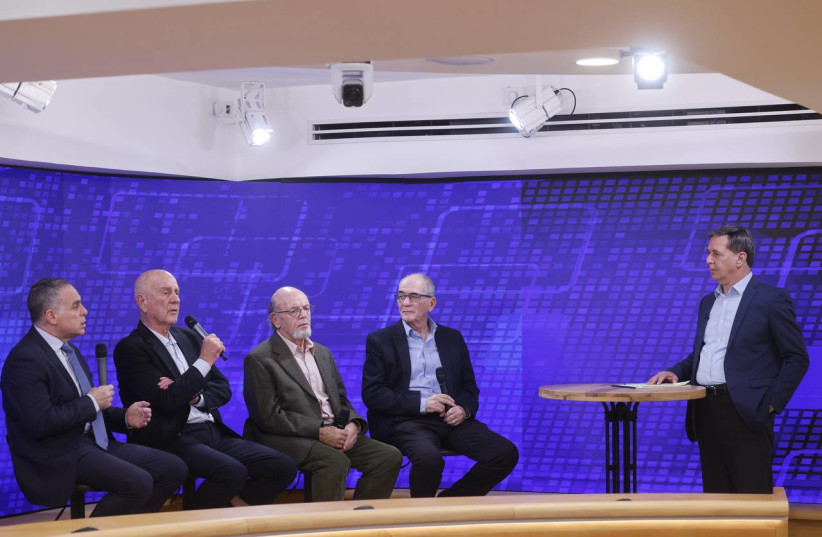A host of security experts participated in a wide-ranging discussion on Israeli sovereignty and security at The Jerusalem Post Democracy conference.
The panel was moderated by Post Palestinian affairs correspondent Khaled Abu Toameh and included Israel Defense and Security Forum research director and Jerusalem Center for Public Affairs senior fellow Brig.-Gen. (res.) Yossi Kuperwasser; Efrat Mayor Oded Revivi; Commanders for Israel’s Security chair Maj.-Gen. (ret.) Matan Vilnai; and former Foreign Minister legal adviser and former ambassador to Canada Alan Baker.
Toameh posed a wide variety of questions, ranging from thoughts on the unrest regarding proposed judicial reform, to the effects the expanded powers given to Bezalel Smotrich in the Defense Ministry will have on the IDF, the status of the Palestinian Authority, and hopes for a future peace.
In response to Toameh asking if Israel is headed toward civil war, Kuperwasser replied, “We are not headed in this direction. I have heard apocalyptic statements, and while there is a debate, I hope that we will be able to handle the debate in a civilized manner.”
In his view, Israel will remain a full-fledged democracy, despite the stresses and strains of the past few weeks. “Everyone is speaking that this is the end of democracy,” said Kuperwasser. “What is this nonsense? We are a democracy and we shall remain a democracy.”

Kuperwasser stated that certain judicial reforms should be enacted so that different parts of society will be better represented in the judicial system.
“I think there should be reform,” he said. “We need to make sure there is more representation of other parts of society in the judicial system. It is not the case at this point.”
Baker said that what is most significant is how Israel’s legal system appears from abroad.
“A solid, credible, viable judicial system may keep the international courts away from Israel,” he said. “It is important that there be a credible judicial system in this country.”
Vilnai was critical of military and police authority being given to Smotrich and Itamar Ben-Gvir.
“You need to have a unified command. You can’t have two ministers in one office. There must be one commander, and this is the basic system of the IDF.” Referring to Defense Minister Yoav Gallant’s order to evacuate an illegal outpost, in opposition to Smotrich’s position, Vilnai said, “We saw chaos last week, and there will be much more if this continues.
Discussing the viability of the Palestinian Authority, Toameh asked Baker if the recent Israeli sanctions on the PA could cause its collapse. Baker replied that the potential collapse of the PA is unlikely, and such an event would be detrimental for both sides. Regarding sanctions that Israel has imposed on the PA, he added, “Sanctions are necessary as long as the Palestinian leadership is violating its commitment from the Oslo Accords. Paying salaries for acts of terrorism is a clear violation of international law, and they have been doing it openly.”
Toameh raised the subject of increased tensions between Israelis and Palestinians in Judea and Samaria, and what can be done to decrease them.
Revivi said, “I see frustrated Palestinians in the region who don’t know where this thing is going and who are fed up with the Palestinian Authority and see that it is corrupt.”
Kuperwasser said there was a possibility of an escalation of violence in Judea and Samaria and recommended that the IDF continue its efforts to prevent acts of terror before they take place. He added that the government should clarify to the Palestinians that there will be serious consequences if they incite to violence.
“We should send a very clear message to the Palestinians that what they do comes with a price,” he said. “For the first time, we have seen signs that this new government is ready to deliver this message that there is going to be a price for supporting terror.”
Revivi said clamping down on the Palestinians has not brought peace, and peaceful gestures have also not led to a cessation of hostilities. Until both sides realize that each must compromise, the situation won’t improve.
Speaking of bringing better relations in Efrat, he said, “I believe in building bridges and not fences. When they see shopping centers and industrial areas, where Jews and Arabs are working on the same conveyor belts and shopping in the same supermarkets, they see that something can be done differently.”
While Baker suggested there was a chance the Oslo peace process could move forward if a responsible Palestinian leadership takes over after Mahmoud Abbas leaves the scene, Kuperwasser was less sanguine about this possibility and said, “The prospects for peace are far away. The Palestinian Authority is not there at all. We need to maintain the status quo and take care of our security needs.”
Vilnai suggested that the government should begin to separate from the Palestinians while the IDF retains its security deployment, pointing out that only 47% of those living between the Jordan River and the Mediterranean Sea are Jewish. If Israel does not separate from the Palestinians [while retaining security control], he said, and remains connected with the Palestinians, it will begin losing its national Jewish character and will be getting closer to the reality of Lebanon.
Unless Israel separates from the Palestinians, Vilnai warned, “Israel will become a state for two peoples. Our mission is to have a secure, Jewish and democratic state. If we do not separate from the Palestinians, we are doing the opposite."